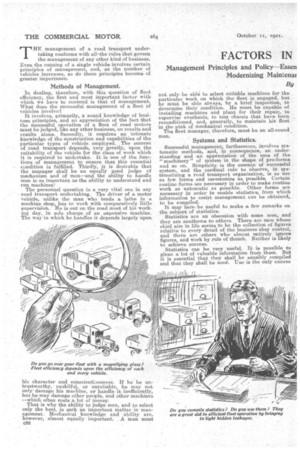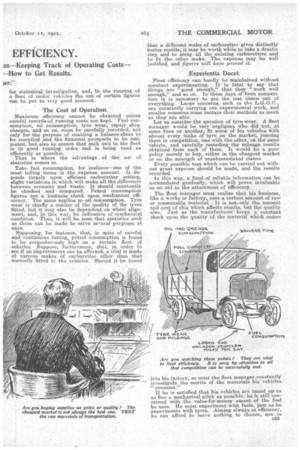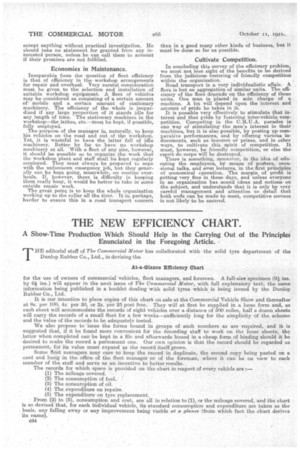FACTORS IN EFFICIENCY.
Page 22

Page 23

Page 24

If you've noticed an error in this article please click here to report it so we can fix it.
Management Principles and Policy—Essen Modernizing Mainlenar
es—Keeping Track of Operating Costs-How to Get Results.
By ler."
THE management of a road transport undertaking conforms with allsthe rules that govern the management of any other kind of business. Even the running of a single vehicle involves certain principles of management, and, as the number of vehicles increases, so do the principles become of greater importance.
Methods of Management.
In dealing, therefore with this question of fleet efficiency, the first and most important factor with which we have to contend is that of management. What does the successful management of a fleet of vehicles involve?
It involves, primarily, a sound knowledge of business principles, and an appreciation of the fact that the successful operation of a fleet of road motors must be judged, like any other business, on results and results alone. Secondly, it requires an intimate knowledge of the construction and capabilities of the particular types of vehicle employed. The suecess of road transport depends, very greatly, upon the suitability of the vehicle for the class of work which it is required to undertake. It is one of the functions of management to ensure that this essential condition is fulfilled. Thirdly, it is desirable that the manager shall be an equally good judge of mechanism and of men—and the. ability to handle men is.as important as the ability to understand and run machines" The personnel question is a very vital one in any road transport undertaking. The driver of a motor vehicle, unlike the man who tends a lathe in a machine shop, has to work with comparatively little supervision. He is out on the road most of his working day, in sole charge of an expensive machine. The way in which he handles it depends largely upon his character and conscientiousness. If he be untrustworthy, unskilful, or unreliable, he may not only damage his machine, or handle it inefficiently, but he may damage other people, and other machines --which often costs a lot of money. That is why the ability to judge men, and to select only the best, is such an important matter in 'management. Mechanical knowledge and ability are, however, almost equally important. A man must 032
not only-be ableto select suitable machines for the particular work on which the fleet is engaged, but he must be able always, by a brief inspection, to determine their condition. He must be capable of installing machines and plant for their repair, to supervise overhaul, to test chassis that have been _ reconditioned, and, generally, to maintain his fleet in the pink of mechanical condition.
The fleet manager, therefore, must be an all-round_ man.
. Systems and Statistics.
Successful management, furthermore, involves systematic methods, and, in consequence, an understanding and an appreciation of the uses of the " machinery " of system in the shape of pro-forma. and so on. Simplicityis the essence of successful system, and the cardinal rule to observe, in systematizing a road transport organization, is to use as few forms and ceremonies as possible. Certain routine forms are necessary in order to make routine work as automatic as possible. Other forms are necessary in order to enable statistics, from which information to assist management can be obtained, to be compiled. It may here. be ueeful to make a few remarks on. the subject of statistics.. Statistics are an obsession with some men, and they are anathema to others. There are Illell whose chief aim in life seems to be the collection of figures relative to every detail of the business they control, and there are others who almost entirely ignore figures, and work by rule of thumb. Neither is likely to achieve success. .
Statistics can be very useful. It is possible to glean a lot of valuable information from them. But it is essential that they shall be sensibly compiled and that they shall be used. Use is the only excuse
for statistical investigation, and, in the running of a fleet of motor vehicles the use of certain figures can be put to very good account.
The Cost of Operation.
Maximum efficiencybe obtained unless
careful records,of running costs are kept. Fuel consumption, oil consumption, tyre wear, repairshop charges, and so on, must be carefully recorded, not only for the purpose of enabling a balance-sheet to be compiled and the financial prospects to be estimated, but also to ensure that each unit in the fleet is in good running order and is being used as efficiently as poseible.
That is where the advantage of the use of statistics .comes in.
Take fuel consumption, for instance—one of the most telling items in the expense account. It depends largely upon efficient carburetter setting, slight variations in which will make all the difference between economy and waste. It should constantly be checked and compared. Petrol consumption figures are a business check upon mechanical efficiency. The same applies to oil consumption. Tyre wear is chiefly a matter of the quality of the tyres fitted, but it may also be dependent on wheel alignment, and, in this way, be indicative of mechanical condition. Thus, it will be seen that• statistics such as these can be made to serve several purposes at once.
Supposing, for instance, that, in spite of careful and continuous tuning, petrol consumption is found to be preposterously high on a certain fleet of vehicles. Suppose, furthermore, that, in order to see if an improvement can be effected,.a trial is inade of various makes of carburetter other than that normally fitted to the vehicles. Should it be found
that a different make of carburetter gives distinctly better results, it may be worth while to take a drastic step and to scrap all the existing carburetters and to fit the other make. The expense may be well justified, and figures will have proved it.
Experientia Docet.
Fleet efficiency can hardly be maintained without constant experimenting. It is fatal to say that things are good enough," that they "work well enough," and DO on. In these days of keen competition it is necessary to get the last Ounce out of everything. Large concerns, such as the L.G.O.C., are constantly carrying out experimental work, and smaller concerns must imitate their methods as much as they are able.
Let us consider the question of tyre wear. A fleet manager would be very negligent who did not, at some time or another, fit some of his vehicles with almost every make of tyre on the market, running them in competition, one with the other, on the same vehicle, and carefully recording the mileage results obtained from each of them. It would be a .poor policy merely to buy, either in the cheapest market or on the strength of unsubstantiated claims.
Every possible test. which can be carried out without great expense should be made, and the results recorded.
In this way, a, fund of reliable information can be accumulated gradually, which will prove invaluable as an aid to the attainment of efficiency.
The fleet manager must realize that his business, like a works or factory, uses a certain amount of raw or consumable material. It is net,only the amount and cost of this which affects results, but the quality also. Just as the manufacturer keeps a constant check upon the quality of the material which comes
-into his factory, so must the fleet manager constantlyinvestigate the merits of the materials his vehicles "consume."
If he is satisfied that his vehicles are tuned up to as fine a mechanical pitch as possible, he is still concerned with the value-for-money aspect of the fuel he uses. Be must experiment with fuels, just as he experiments with tyres. Aiming always at efficiency, he can afford to leave nothing to chance, nor to accept anything without practical investigation. lie should take no statement for granted from any interested person, unless he can call them to account if their promises are.not fulfilled.
Economies in Maintenance.
Inseparable from the question of fleet efficiency is that of efficiency in the workshop arrangements for repair and overhaul. Very careful consideration must be given to the selection and installation of suitable workshop equipment. A fleet of vehicles may be considered as consisting of a certain amount of' mobile and a certain amount of stationary. machinery. The efficiency of the whole is jeopardized if any large proportion of it stands idle for any length of time. The stationary machines in the workshop—the lathes, etc.—must be kept. if possible, fully employed. The purpose of the manager is, naturally, to keep his vehicles on the road and out of the workshop. Yet, it is wasteful to have the latter full of idle, machinery. Better by far to have no workshop machinery at all. With a fleet of any size, however, it should be possible so to -organize the work that the -workshop plant and staff shall be kept regularly employed. They must always be prepared to cope with the unforeseen emergency job, but they generally can be kept going, meanwhile, on routine overhauls. If, however, there is difficulty in keeping them really busy, it would be better to take in some outside repair work.
The great point is to keep the whole organization working up to the collar all the time.. It is. perhaps, harder to ensure this in a road transport concern than in a good many other kinds of business, but it must be done so far as possible.
Cultivate Competition.
In concluding this survey of the efficiency problem, we must not lose sight of the benefits to be derived from the judicious' fostering of friendly competition within the organization. Road transport is a very individualistic affair. • A fleet is but an a,g,gregation of similar units. The efficiency of the fleet depends on the efficiency of those units. One man is placed in sole charge of a machine. A lot will depend upon the interest and amount ef pride he takes in it. It is possible very effectively to stimulate that interest and that pride by fostering inter-vehicle competition. Competing in the C.M.U.A. parades is one way of stimulating the men's interest in their machines, but it is also possible, by posting up-comparative performances, and by offering variousinducements, such as bonuses or prizes, and in other ways, to cultivate this spirit of competition. It must, however, be friendly competition, or else the esprit de corps will be destroyed. There is something, moreover, in the idea of educating the employees, by means of posters, occa. • sional talks, and even lectures, in the first principles of economical operation. The margin of profit is getting very fine in these days, and unless everyone in an organization has sound 'ideas and notions on the subject, and understands that it is only by very careful management and attention to detail that both ends can be made to. meet, competitive success is not likely to be assured.




















































